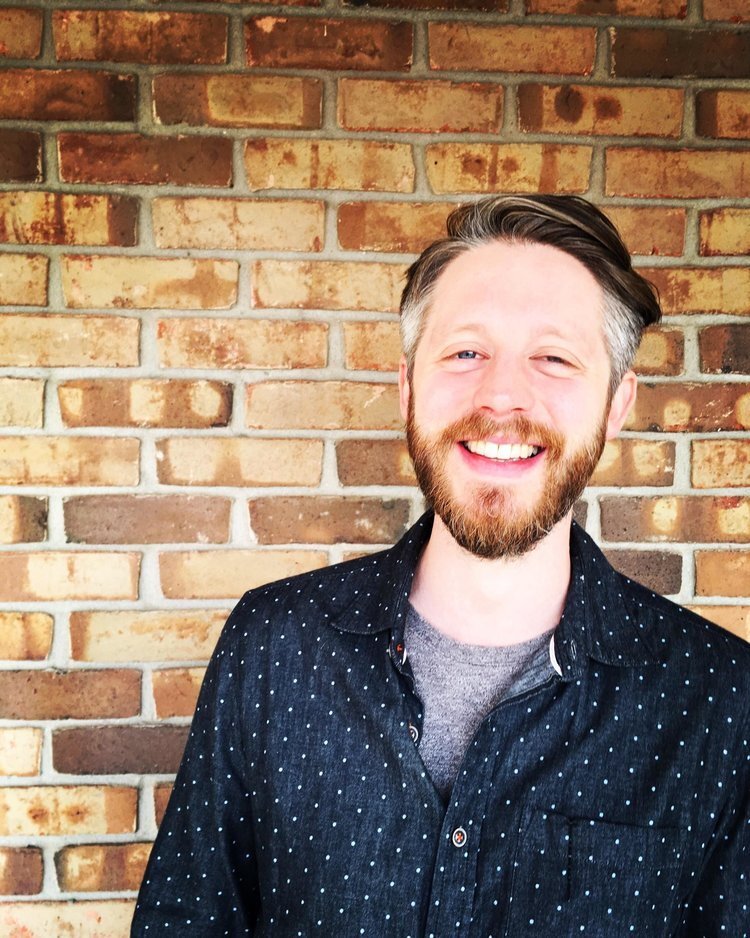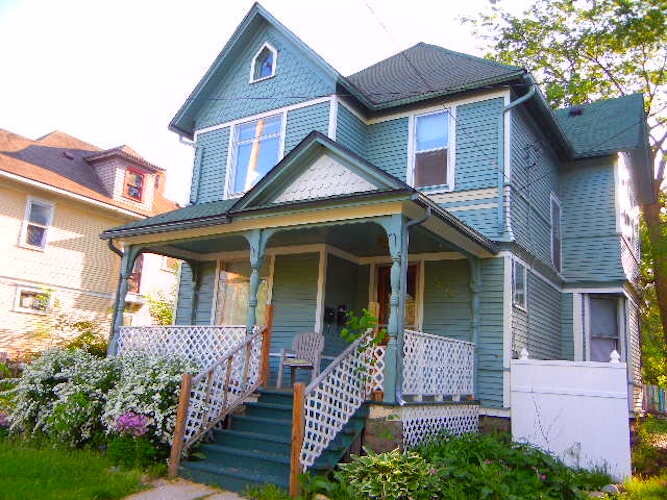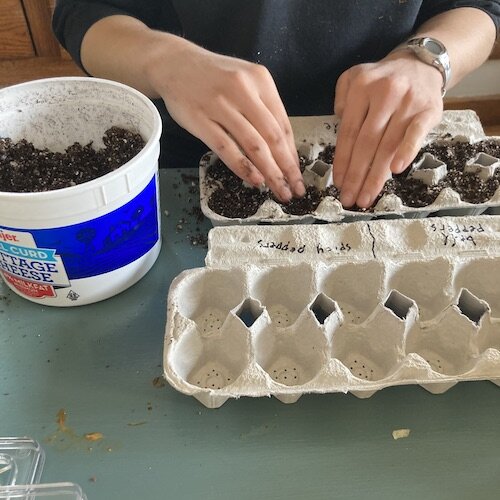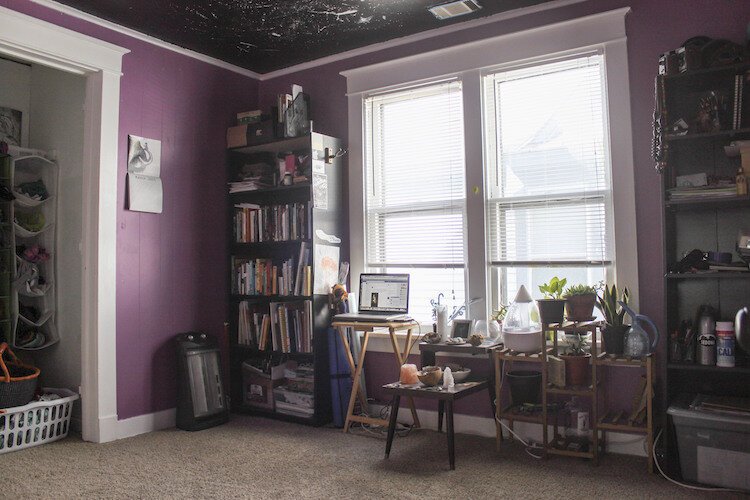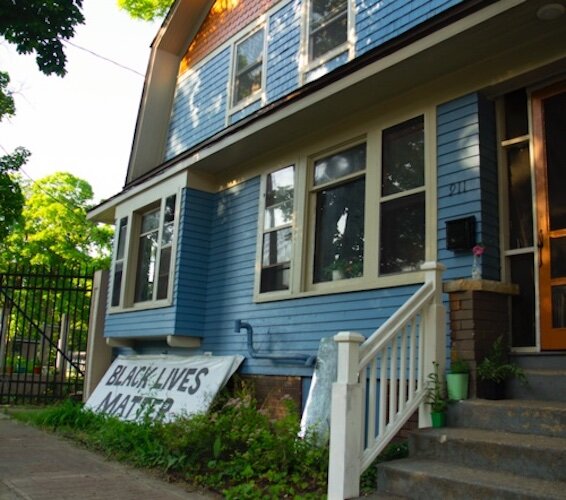Kalamazoo Collective Housing offers an alternative to the downside of being a renter
Kalamazoo Collective Housing will open two new houses in the fall and is currently accepting applications.
A Way Home — Housing Solutions: This story is part of Southwest Michigan Second Wave’s series on solutions to homelessness and ways to increase affordable housing. It is made possible by a coalition of funders including the City of Kalamazoo, Kalamazoo County, the ENNA Foundation, Kalamazoo County Land Bank, and LISC.
If you’ve had roommates, then you know.
Sometimes they can be like a family. And sometimes they can be like cats who hate each other trapped in a crowded cage — pure chaos.
If you’re a renter, then you also know. No matter if you’re living with roommates, partners, your family with kids, or as an individual, it can also be pure chaos. Your landlord raises the rent, sells the building, ends the lease for whatever reason, and you have to pack up and find a new place.
The members of Kalamazoo Collective Housing have been trying a different way. Their goal is to provide stable, affordable, housing for renters without the chaos.
In the over 15 years since they started, the KCH has grown to three houses, one subdivision, and two new homes yet to be filled. All are in the Vine neighborhood.
Have they found a solution to Kalamazoo’s housing crisis? How do they manage to make living under a roof in Kalamazoo affordable?
There was a long pause during a phone interview with KCH executive director Chris Moore and board chair Qynce Chumley when these broad, general questions were dropped on them.
“We’re gathering thoughts…” Moore says.
Chumley finally speaks. “I find it kind of difficult to engage with the framing of this question. Maybe because I don’t personally believe that affordable housing is the solution to the housing crisis, because the housing crisis is just, at its core, caused by capitalism, and the fact that we treat housing as a commodity is the cause of the housing crisis. The fact that we have to pay for housing is the housing crisis in itself.”
Simply making some housing affordable isn’t going to solve the housing crisis, Chumley says. Housing should be “a thing that everybody just has access to, no matter who they are.”
Moore says, “the goal is that every single human being has housing. It doesn’t seem structurally possible within the existing framework of the way housing is — I’m a homeowner right now, and I’m in part a homeowner because I was able to save up some money while I lived at KCH. But I’m not participating in a system where I’m just accruing equity by existing.”
As a homeowner, he has mortgage payments that are lower than most people’s rents, he later explains. “It’s just gross how much money I pay on a mortgage compared to how much people pay on rent,” Moore says. “You’d be paying three or four times as much money as you are now if you were renting the same house you live in.”
What KCH does “is kind of a bandaid solution to an unsolvable problem,” Moore says.
Organized roommates
Nightmare scenarios of roommates-gone-bad still live in this writer’s head, though the unwashed dishes, theft, and one literal knife-fight (no injuries; I was not involved) were way back in the early ’90s.
How does KCH avoid the chaos?
They pause, laugh, and say, “well… there is chaos.”
“In my experience in living with folks before living in co-ops, that was also my experience,” Moore says. “It was really hard to tell, before moving in with somebody, whether or not they’re going to be a good roommate or somebody you’ll mesh with socially.”
Their philosophy is, conflict, arguments, and dirty dishes are not avoidable. “So what we do is, we intentionally create structures and systems and processes, and a culture, where people are offered a lot of different ways to navigate those types of conflict…. Otherwise, it’s a contest of wills, or it’s like who’s going to decide to leave first, or you’re going to have a big blowup and nobody wants to talk to each other,” Moore says.
“We do try to do a lot of work before things happen,” Chumley says. There are formal agreements in the houses and a conflict resolution process. House meetings and votes on issues are a weekly occurrence. “People who’ve been living in the co-ops for a while, are practiced in those kinds of skills.”
“Qynce and I are both deep in the weeds in all the stuff,” Moore says.
Chumley lives in a KCH house now. Moore used to.
Everybody making decisions at KCH is a member, and have lived the co-op life. “There’s no landlord, obviously, but there’s also not a nonprofit board of folks who have no direct experience with what we do,” Moore says.
They have two new houses, next to each other in the Vine, that’ll be open in the fall. “What we’re specifically hoping for with those two new places is somebody with a really strong vision for what the house might be like,” Chumley says. Other co-op group homes have themes, “and it might be like sustainability, or this is a house centered around the experiences of queer and trans people…. a vision for what is going to happen in that house because that helps motivate and bring people together.”
It helps that people are compatible as roommates, of course. “We have an interview process,” for applicants, Moore says. People are asked “questions about yourself, narrative questions, because we’re more interested in what you do and who you are and how you think, how you interact with folks (more than) how much money do you make and do you have pets or whatever.”
Interviews become face-to-face with the current members of the house, who have the final decision.
Survival mechanism
Chumley says that housing co-operatives, “exist as a kind of survival mechanism within capitalism. We exist to try to survive in the current system as it’s set up…. We exist to try to mitigate the effects of capitalism for our members, to make their lives a little bit better, and to hopefully allow them to take action in other ways.”
Addressing the needs of low-income residents is part of their vision statement. Open rooms are listed on their site for $440 to $553, which includes utilities, staple foods, and household supplies. One- to four-bedroom apartments at their Perennial Cohousing building go for $603-$975 a month, electricity and gas not included.
“We have a bunch of ways to keep costs low. And what that ends up doing is, is it relieves the pressure off of our members to break their backs working five jobs just to be able to afford rent,” Moore says. “And that does have a material benefit to those folks.”
There are more than just financial costs in renting. Renting tends to lead to a transient life — no security, no sense of place or connection with a neighborhood.
KCH started in 2006, when “ten of us who had all these bad experiences with renting” moved in together, Moore says. Founding members rented a house in the Vine neighborhood, ran it as a co-op, but didn’t own it.
In less than a year they found out their landlord was being foreclosed on, and he didn’t inform them that they’d soon have to leave. “That’s a perfect example of the structural instability of renting in general.”
Moore gives a current example of friends who both have jobs, and a family with two children, “they’ve got their life together, and they’re renting a place that’s adequate for their family, and it’s $1,500 a month, which is outrageous. And they’re finding out their landlord is selling the house.”
People who otherwise have their lives together “are thrown into chaos. And it has nothing to do with them, it has nothing to do with how they treated the house, their ability to pay, or anything like that. That’s the world of renting.”
Renting’s transient nature has an impact on a family’s savings, health, and education — “just bouncing around every year to a new place is very bad, especially for kids,” he says. “Sure, you might find an affordable apartment, but you always have to be ready for that landlord to raise the rent by a few hundred dollars, or just not to renew your lease because they’re going to do renovations to raise the rent a few hundred dollars, or they’re going to sell the house to withdraw their equity.”
Kalamazoo Collective Housing does “a lot of work to keep our rates lower, and to make sure people who live in our houses don’t have to leave all the time…. A phrase we use a lot in conversations like this is ‘permanently affordable.’ ‘Affordable’ is how much money does it cost. But ‘permanent’ is in some cases even more important. If you’re a member of KCH, unless you break one of our big rules, like hurting people, you get to stay, and we’re going to do everything we can to make sure you can stay as long as you want to stay,” Moore says.
Leasing is a broken system, “and we exist in the system,” Moore says.
Though KCH is a different sort of landlord, they’re facing what regular landlords face.
“The pressure to keep things affordable, that landlords experience, we also experience, except for a couple of notable differences. One of which is, we never sell our houses.”
They’ve purchased houses that were run-down, worked to refurbish them, and could sell to make a profit, but “we just don’t do that…. There’s nobody (at KCH) that decided 15 years ago they were going to get into investing, and now are reaping the profits of that investment.”
That helps keep rent low — no one is making a profit “to reward them for their investment.”
KCH also deals with inflation, the shortage of skilled labor, and other pressures, “but it turns out when you remove housing from the asset world, you actually do get a pretty decent chunk of money back.”
Maintaining neighborhoods
If you’re a homeowner, you can pass a house and land, or their worth, to your family. Generations of renters have nothing to pass on, leading to decades of economic inequity, especially for people of color.
“That’s like an intentional feature of the system as designed. Generational wealth and inheritance… that’s not an accident,” Moore says.
Chumley says people put work and care into the homes of KCH “in order that they can still be here for the people who come after us. Instead of doing this for my family or my lineage, I’m doing this for the community-at-large. My wider family — some are strangers to me, but they are who come afterward and enjoy this home.”
Most of the houses were “junk” when they got them, Moore says. “And we put a lot of care into them…. We have higher standards for houses than the typical landlord would.” They think about the dwellings not like landlords and renters, but like a homeowner would.
“We’re trying to be a force in our neighborhood. We find a house, we fix it up, we put people in it, and then we don’t sell that out for profit at any point. And it maintains the character, the affordability, the culture, and community in our neighborhoods that might occur otherwise — folks are constantly pushed out and shifted around based on market forces. And that destroys communities.”
KCH is a 501c3 non-profit organization, which has had “varying reliance on grants,” Moore says, for new projects or new houses. Support has come from the Kalamazoo Community Foundation, Irving S. Gilmore Foundation, Stryker Johnston Foundation, and others. “But our core operations are all funded by fees from our members. They work to be sustainable, “so if we were to lose all grant funding, it would require some changes, but we would be fine for the most part.”
For Chumley, it all goes back to the more positive qualities of having roommates, when they’re able to share chores or just hang out in the living room or garden.
Chumley says, “the most important part about that to me is the relationship building and emotional support.” That support also makes living affordable. “When people are on their own, things are more expensive. It’s more expensive to live on your own. You’re the only person in charge of the rent, your food costs, utilities, all that. Sharing resources is one of the things we do to keep costs lower.”

